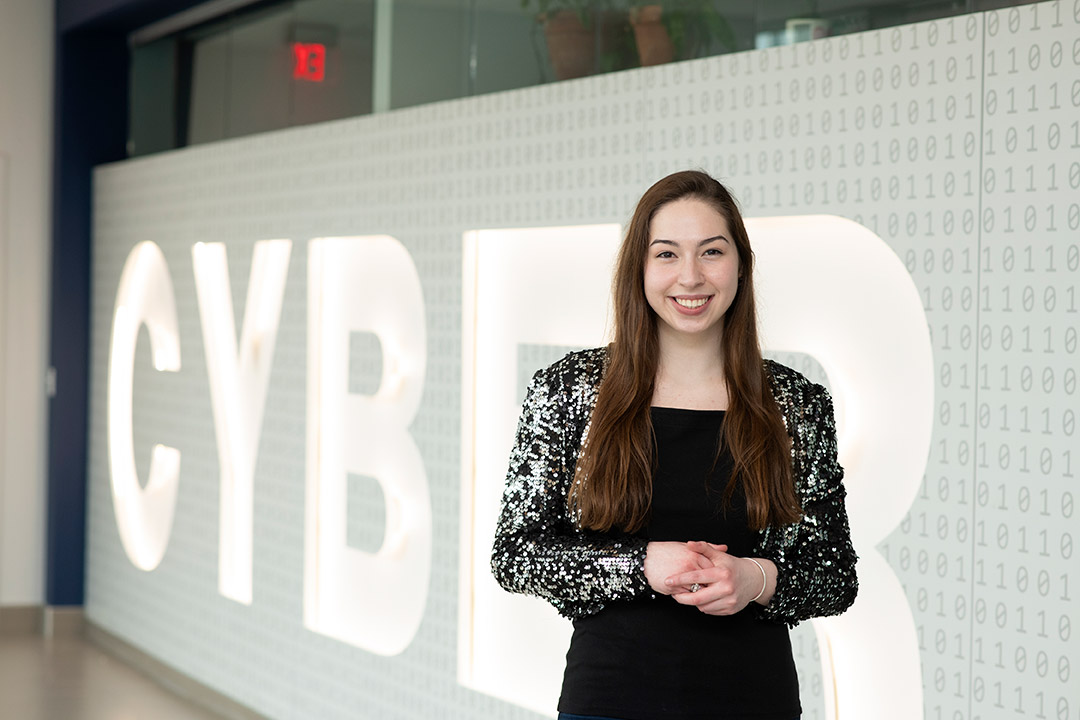Computing double major juggles school, work, and clubs
Olivia Gallucci’s passion pushes her to succeed in a wide array of activities
A. Sue Weisler
Olivia Gallucci stands in the ESL Global Cybersecurity Institute.
Olivia Gallucci is a second-year computing security and computer science double major from Lancaster, Pa., with a minor in free and open source software and free culture. She holds executive-board positions for two clubs, regularly presents research, and has received multiple internship opportunities. Gallucci enjoys sailing and writing about security, open source, and college on her personal website.
What sparked your interests in computing security and computer science?
The Free and Open Source Software (FOSS) community inspired me to pursue a career in computer science (CS). I loved that the FOSS community created programs collaboratively by allowing everyone to use, study, share, and modify the code.
Then, I watched How Anonymous Hackers Changed the World and We Are Legion: The Story of the Hacktivists. I was like, “Wow. I want to do that.”
I knew I had to double major in computing security (CSEC) and CS when I learned about the vulnerabilities caused by insecure code. By double majoring, I could understand cybersecurity and software development to create and maintain secure programs. RIT was the only school in which CSEC and CS programs did not overlap. Furthermore, it offered a FOSS and free culture minor and immersion. At that point, I knew that RIT was the perfect choice for me.
What do you love most about the clubs you’re a part of?
I am the treasurer of RITSEC, RIT’s security club, and the vice president of RIT’s Women in Cybersecurity Chapter (WiCyS@RIT). I joined these clubs because they are incredibly open and friendly; RITSEC’s motto is “Security Through Community.” They have a universal focus on ensuring everyone can learn in an inclusive and productive space, and they encourage people to reach out if they want help or advice. For example, I thought it would be a waste of time as a freshman to engage in the co-op search because I had no STEM education or tech work. Luckily, RITSEC and WiCyS members reviewed my resume, corrected my misunderstandings about the co-op search, and encouraged me to attend career fairs. As a result, I obtained a Cyber Risk and Advisory Internship at Deloitte’s 30 Rockefeller office in New York City.
How do you balance school, work, and clubs?
Intense calendaring. I schedule weekly-occurring events for class, homework, commute, clubs, work, sleep, free time, lunch, and just about everything else. Most importantly, I planned my course load well. When I was a freshman, I maintained a 4.0 GPA while taking course overloads because I took so many gen-eds. Now, I can only handle 12 credit hours. I do not have a background in my upper-level courses, so I need to spend more time studying. In addition, I work 20 hours per week at various part-time jobs, which takes up a lot of the time I used for studying as a freshman.
What motivates you to be involved with so many activities?
Overall, it is a mix of personal drive, enjoyment, and socialization preferences. I firmly believe in never eating alone, and I spend my spare time volunteering, conducting research, or developing presentations. I enjoy socializing through activities like hacking competitions and sailing. This way, I can spend time with friends, network, and learn.
What are your career aspirations after college?
I have so many goals. Academically, I would like to pursue a Ph.D. in computer science and dream of becoming a Rhodes Scholar. Career-wise, I would like to focus on open source software (OSS) and offensive security. Although I am not sure what company I will end up in long term, I will be an Offensive Security intern at Apple in California, starting in May. I would also like to be on the board of Open@RIT, the Open Source Initiative, the OpenSSF, or another OSS-related entity, like the Electronic Frontier Foundation.













